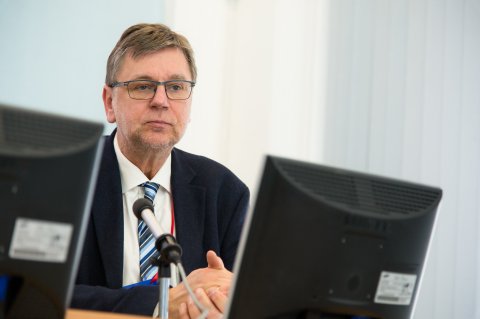President of European Journalism Training Association (EJTA – Belgium) Nico Drok has once again come to Chelyabinsk to participate in the Third Communication Leader of the 21st Century International Scientific and Educational Forum at SUSU.
Candidate of Sciences (Sociology) at Radboud University in Nijmegen, Nico Drok is holding the Degree of Master Economics of the University of Groningen, and is the Professor on Media and Civil Society at Windesheim University of Applied Sciences (the Netherlands). His main fields of research are civil and news journalism, journalism education and youth.
At the last year’s forum the EJTA President delivered his presentation, held master classes for lecturers and students on the issues of modern journalism, and was awarded the title of Professor Emeritus of the SUSU’s Faculty of Journalism. Collaboration of SUSU and European Journalism Training Association was successfully developing during the course of the previous year.
.jpg)
.jpg)
“Following the invitation by EJTA, SUSU took part in Science-to-Practice Conference on Journalism Education without Limits as institutional member of European Journalism Training Association. The collected conference materials in English included a publication on the “New Borders of Professional Journalism” by the employees of the Faculty of Journalism of the SUSU Institute of Social Sciences and Humanities,” notes Dean of the SUSU’s Faculty of Journalism, Doctor of Sciences (Philology) Lyudmila Shesterkina.
In January of 2018 SUSU, among 70 leading journalism training centers of Europe, became a participant of a new big-scale international research project on the Role, Values and Qualifications of Journalists in the Era of Digital Technologies.
“This was an online study of the opinions of teachers around Europe. Over 1,000 journalism lecturers took part in it. The study was held in several languages including Russian, and it touched upon the culture of journalism, its value and goal. The final questions referred to qualifications of the journalists-to-be. The uniqueness of this research was that among its participants were both the professionals of the journalism world and students from around the globe. The main mission was to understand how lecturers see journalism. We believe that namely journalism teachers play the key role in updating of this profession.Thanks to this study we were able not only to appreciate the differences between the countries, but also obtain information on various ideas of what journalism is among the teachers themselves, journalists and students,” says Nico Drok.
.jpg)
The Professor also shares his opinion of the Communication Leader of the 21st Century Forum which is being held at SUSU:
“I’m impressed with the scale of the event. And I’m happy that the forum has gathered so many guests from different countries. The most important thing is that when people are talking, they’re not fighting – and this is the very main goal of this forum. We need to give people a chance to talk. I see that young people are very happy that such a forum is being held, because everything we do, we do for them, and it’s them who will be the leaders of the 21st century.”
As part of his visit Nico Drok delivered a presentation for the communication forum participants on the News as Efficient Instrument of Social Dialogue between the Countries of Europe and Asia; held a master class on What Knowledge and Skills Should a Journalist of the 21st Century Have; and discussed the promising issues of international collaboration with the university’ top management regarding preparation to holding a science-to-practice conference of European Journalism Training Association at South Ural State University in 2020.




